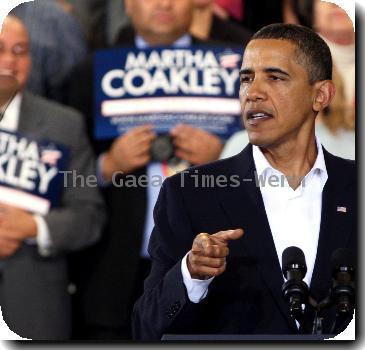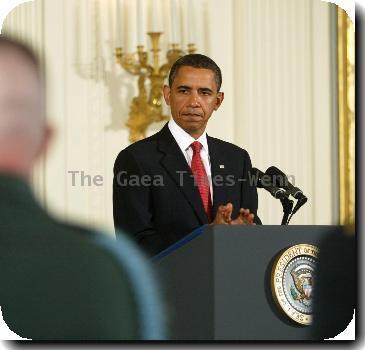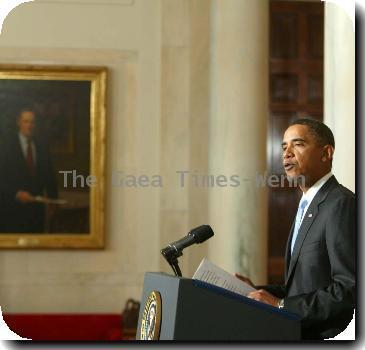Obama says Dems will get health care remake done with or without Republicans
By Ricardo Alonso-zaldivar, APFriday, February 26, 2010
Bottom line on health care summit: Dems push ahead
WASHINGTON — Democratic leaders vowed Friday to resurrect their long-stalled health care legislation, with or without Republican suggestions or votes.
One day after an unprecedented health care summit that brought together President Barack Obama and lawmakers of both parties, House Speaker Nancy Pelosi said the nationally televised event showed GOP lawmakers are “accepting of the status quo” in which insurance companies mistreat consumers.
She told reporters at a news conference there are “good prospects for passing” health care legislation along the lines Obama has outlined, even if Republicans refuse their support.
The Senate’s second-ranking Democrat, Richard Durbin of Illinois, seconded the determination to move ahead. “We are not going to wait,” he said.
Both Pelosi, D-Calif., and Durbin said Democrats would consider Republican suggestions for changes. They aren’t likely to get much. Spokesmen for the House and Senate Republican leaders said Friday their party does not plan a formal response to Obama, having made clear a belief that Democrats should scrap their bills.
The House and Senate both passed sweeping bills late last year, and had appeared on the cusp of reaching agreement on a final compromise that could remake the nation’s health care system early last month. In general, the bills would have expanded coverage to tens of millions who lack it, while curbing insurance industry abuses such as banning the denial of coverage on the basis of pre-existing medical conditions.
Those efforts buckled when Republicans won a special election for a Senate seat in Massachusetts, depriving Democrats of the 60 votes they need to block GOP filibusters.
Now Democratic leaders are attempting a complicated rescue mission that could involve having the House pass the bill the Senate has already cleared — on the condition that a second measure would remove or alter provisions that are objectionable to numerous House Democrats.
Sen. John McCain, R-Ariz., said Republicans are still willing to negotiate changes in the health care system with Obama, but only on a “step-by-step” basis.
McCain said on ABC’s “Good Morning America” he believes the White House summit on the medical care system was beneficial and many people learned a lot from it.
But he also said it is time “to start over. What we’re saying is, let’s start out on the areas we agree upon.” The Arizona Republican said the GOP would be “seriously interested” in negotiating a less complex, less sweeping health care bill with the Obama administration.
In their remarks, Durbin and Pelosi echoed Obama’s closing statement on Thursday that Democrats will move forward on a health care overhaul with or without Republicans, preparing his party for a fierce fight whose political outcome will rest with voters in November.
Delivering his closing argument at a 7-1/2-hour televised policy marathon, Obama told Republicans he welcomes their ideas — even ones Democrats don’t like — but they must fit into his framework for a broad health care remake that would cover tens of millions of uninsured.
It’s a gamble for Obama and his party, and it’s far from certain that Democratic congressional leaders can rally their members to muscle a bill through on their own. At stake are Democrats’ political fortunes in the midterm elections and the fate of Obama’s domestic agenda pitted against emboldened Republicans.
“The truth of the matter is that politically speaking, there may not be any reason for Republicans to want to do anything,” Obama said, summing up. “I don’t need a poll to know that most Republican voters are opposed to this bill and might be opposed to the kind of compromise we could craft.
“And if we can’t,” he added, “I think we’ve got to go ahead and make some decisions, and then that’s what elections are for. ”
To the nearly 40 lawmakers in the room with him, the message was unmistakable.
“Frankly, I was discouraged by the outcome,” said Senate Republican Leader Mitch McConnell of Kentucky. “I do not believe there will be any Republican support for this 2,700-page bill.”
Democratic leaders — who preside over majorities in both chambers — were having none of that.
“It’s time to do something, and we’re going to do it,” said Senate Majority Leader Harry Reid of Nevada.
Still, no participant publicly called the daylong exercise a waste of time. Despite flare-ups now and then, they had a remarkably civil debate on an issue that has divided Americans and polarized political partisans.
Obama’s plan would require most Americans to get health insurance, while providing subsidies for many in the form of a new tax credit. It would set up a competitive insurance market for small businesses and people buying coverage on their own. Other changes include addressing a coverage gap in the Medicare prescription benefit and setting up a new long-term-care insurance program. The plan would be funded through Medicare cuts and tax increases.
At the summit, there were some areas of agreement, including barring insurers from dropping policyholders who become sick, ending annual and lifetime monetary limits on health insurance benefits and letting young adults stay on their parents’ health policies into their mid-20s or so.
Yet on the core issues of how to expand coverage and pay for it, the divide was as wide as ever. Democrats argue a stronger government role is essential, and with it higher taxes and new rules for private companies.
“We have a very difficult gap to bridge here,” said Rep. Eric Cantor of Virginia, the No. 2 House Republican. “We just can’t afford this. That’s the ultimate problem.”
Associated Press writers David Espo, Charles Babington, Philip Elliott, Ben Feller, Erica Werner and Natasha Metzler contributed to this story.
Tags: Barack Obama, Geography, Government Programs, Government Regulations, Government-funded Health Insurance, Health Care Industry, Health Care Reform, Industry Regulation, Lamar alexander, North America, Political Issues, Political Organizations, Political Parties, Summits, United States, Washington













